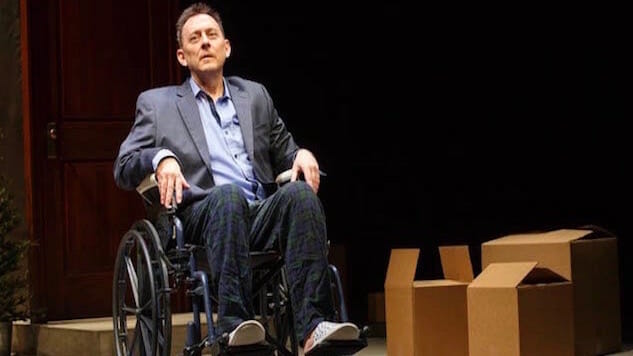
In his book Half Empty, the late, great essayist David Rakoff describes watching David Cromer’s revival of Our Town, having recently been told that treatment for a post-radiation sarcoma may claim his entire arm. Though he buries his anxieties about that prospect deep within himself, upon seeing Emily return to life to witness her twelfth birthday, and seeing the minimalist design of the production melt away into a full and complete portrait of life, complete with real cooking bacon (kept hidden from the audience until the last possible second), Rakoff breaks down.
“Such sound and activity, it is almost too much joy, too much physical presence for both Emily and us,” Rakoff writes. “And I want it all. I want the bacon and all of its entrails, I want my arm, but even more than that, I want the years.”
It is this sense of overwhelmedness—the unshakeable “where do I begin?” that comes with any reflection on the entirety of a human life—that grips both the protagonist and audience of Wakey, Wakey, Will Eno’s newest play and the culmination of his five-year, three-play residency at Signature. Eno, the king of false starts and half-jokes that suddenly give way to real insight, is therefore perfectly suited to tackle this biggest of subjects. Or, as suited as any person can be.
His exploration is channeled through Guy (Michael Emerson), a wheelchair-bound hospice patient at the end of his life. Despite Guy’s situation, the first half of Wakey, Wakey almost impossibly light-hearted. Guy is here to share…something. He takes the audience through guided meditation exercises, jokes liberally, shows them photos and videos via a large projector, and refers occasionally to notecards which remind him to cultivate some vague feeling in the room. If this sounds rambling and unfocused, it is and it isn’t. “Sorry, I don’t know exactly what to say to you,” says Guy after a pause, before adding: I wonder how you hear that… What do you make of the fact that this event, painstakingly scripted, rehearsed, designed, and directed, features someone saying, ‘I don’t know exactly what to say to you.’”
But the formal wit and trickery that characterizes Eno’s humor is still heading somewhere, and it isn’t long before Guy surprises the audience with a simply laid-out thesis; “We probably take almost everything in existence for granted.”
Indeed, the shadow cast by unobserved joys and moments in the presence of death is at the forefront of Wakey, Wakey. The recent deaths of both Eno’s father and Signature Theatre founder James Houghton loom large over this play, and contribute to the feeling in the theatre that Guy’s sickness is not abstract or imagined. Eno and Signature’s desire to make sense of these two very real tragedies is palpable and painful. But the birth of Eno’s daughter seems to be of equal significance to Wakey, Wakey, reflected in Guy’s preoccupation with his own childhood, and perspectives of children in general. In fact, the idea of rebirth counters death at every opportunity within the play’s dialogue with itself. Guy’s nurse Lisa (January LaVoy), notes as much when she unpacks the idea that the people we lose never really leave us in an unexpected and illuminating monologue.
The production itself is equally excellent. Emerson commands the play’s short running time without really physically moving at all, and inhabits each of Guy’s distractions and asides with unnerving spontaneity. Subtle physical reminders of Guy’s illness are played without fanfare, and Emerson and Eno work together to ensure the play’s earnest elements never become saccharine. LaVoy’s presence helps to distinguish the play from what we’d expect from a one-man rumination on death, and her quiet kindness is as essential to the spell this play casts as anything else. Design elements from Christine Jones, David Lander, and Nevin Steinberg are brilliantly unobtrusive (an unused iPhone charger in a bare outlet, and the distant, Chekovian sounds of trucks were two of my favorites), while still giving one Rakoff’s Our Town experience, I promise you.
But Eno (directing his own work for the first time) is the star of Wakey Wakey, and he’s at his most achingly, triumphantly humanist here. Critics and fans alike who compare Eno to Beckett should finally realize what Eno himself actually values in Beckett’s work. Without spoiling anything, Guy’s parting wish for humanity directly echoes Endgame: ”Get out of here and love each other.” And Eno has, in this wonderful, wonderful play, actually struck on something resembling a satisfying answer to death, buried somewhere in the knowledge that we live a million rebirths in even the smallest of gifts we leave behind.
Wakey, Wakey runs through April 2nd at the Signature Theatre